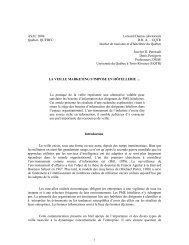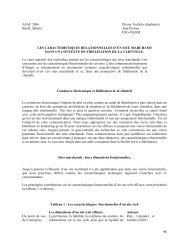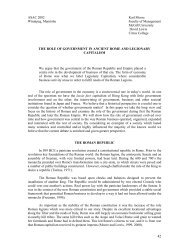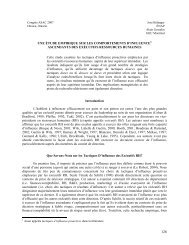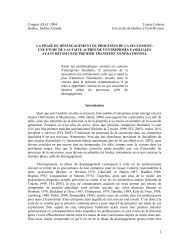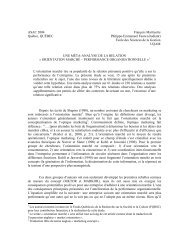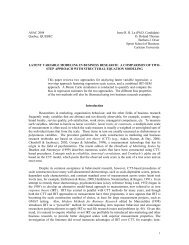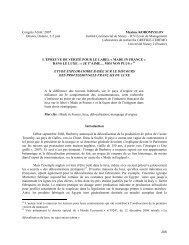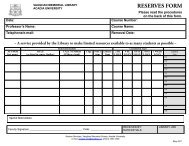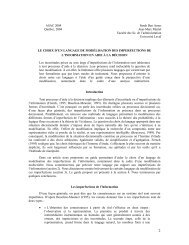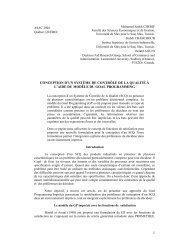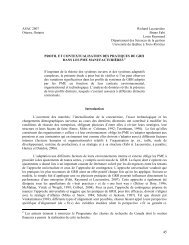ASAC 2004 – Quebec City Lynne Gillis – St. Francis Xavier ...
ASAC 2004 – Quebec City Lynne Gillis – St. Francis Xavier ...
ASAC 2004 – Quebec City Lynne Gillis – St. Francis Xavier ...
You also want an ePaper? Increase the reach of your titles
YUMPU automatically turns print PDFs into web optimized ePapers that Google loves.
for continuing medical education seminars was important yet they did not feel these influenced<br />
their choice behaviour. Physicians also have friendly relations with the PSRs and did not distrust<br />
them, yet they did not view them as a critical part of their practice.<br />
Pharmaceutical Management Implications<br />
There are seven management implications that may be drawn from this study. First, all<br />
physicians demonstrated price sensitivity when deciding which drug to prescribe to a patient.<br />
Consequently, detailing with a focus on low price of a drug as its main differentiating feature may<br />
be effective in Nova Scotia. Therefore it is recommended pharmaceutical companies detailing in<br />
these areas review their personal selling strategies to ensure that in locations where the price of<br />
their product is lower then the competition, sufficient promotional resources be devoted to this.<br />
This is especially true for situations where the drug is not covered, or only partly covered through<br />
a medical plan and the patient would incur out of pocket expenses in receiving treatment with a<br />
particular brand of drug. Perhaps in locations where pharmaceutical drug coverage is higher,<br />
price sensitivity of physicians may be lower.<br />
Second, the availability of samples did appear to influence a physician’s choice behaviour, even<br />
in some situations where the sample offered was not the physician’s preferred choice. In order to<br />
perhaps provide immediate relief of symptoms or reduce a patient’s financial risk a physician<br />
would dispense a sample brand, if their preferred choice were not available. The majority of<br />
patients also mentioned that, barring any complications or adverse effects, they would continue<br />
the patient on the sample brand rather then returning back to their preferred choice, assuming the<br />
patient was still in need of drug therapy. It is important to note however that while a physician<br />
may dispense the sample over his/her preferred choice, the sample had to be somewhat<br />
comparable if not ‘just as good’ to the preferred choice of treatment. It would therefore be<br />
beneficial for a PSR to only leave samples if they knew there were only a limited number of<br />
samples of the physician’s preferred choice in his/her sample cupboard and there were only slight<br />
differences in the composition of the company’s drug to its leading competitor.<br />
Third, as noted before, physicians stated there was a trend in the medical community of<br />
sequential detailing, and stated the worst detailing encounters were those where too much<br />
information was being presented and the detailing was mainly repetitive in nature (only<br />
presenting rehashed information). Promotional activities should therefore be carefully examined<br />
in terms of frequency of sales calls to a particular physician, length of time in a single sales<br />
meeting, quantity of in-house and third-party research presented, quantity of free samples left by<br />
sales representatives and number of Continuing Medical Education events offered so that a<br />
company can optimize the effectiveness of their direct selling efforts with their costs. It is<br />
important for companies to recognize that beyond a certain level, personal selling can be<br />
counterproductive. This is apparent in situations where the amount of cumulative detailing<br />
minutes spent with a physician is so long that a physician becomes annoyed with the information<br />
being detailed to him/her, and stops listening to the information being presented.<br />
Fourth, PSRs with considerations to both time and marketing funds should devote resources<br />
perceived as being important to physicians. The physicians in this study, with the exception of<br />
one, expressed the value of pharmaceutical company sponsored CME events and that CME<br />
events were one of the most important services that PSRs provided. Regular inquires as to what<br />
services physicians desire or deem valuable would allow PSRs to better respond to their needs<br />
and fill potential ‘gaps’ in their services (areas in which the physician is not satisfied <strong>–</strong> i.e., a<br />
CME on cardiovascular disease and treatments).<br />
8




